Gustav Mahler, The New York Philharmonic Orchestra, Leonard Bernstein - Symphony No 4 In G Major
Album: Symphony No 4 In G Major
Rating: 5.0
Table of Contents
Download
Filename: gustav-mahler-the-new-york-philharmonic-orchestra-leonard.zip- MP3 size: 29 mb
- FLAC size: 192 mb
Tracks
| Track | Duration | Preview |
|---|---|---|
| In Gemächlicher Bewegung | ||
| Symphony No. 4 In G Major | ||
| Bedächtig | ||
| Sehr Behaglich | ||
| Ruhevoll (Poco Adagio) |
Images
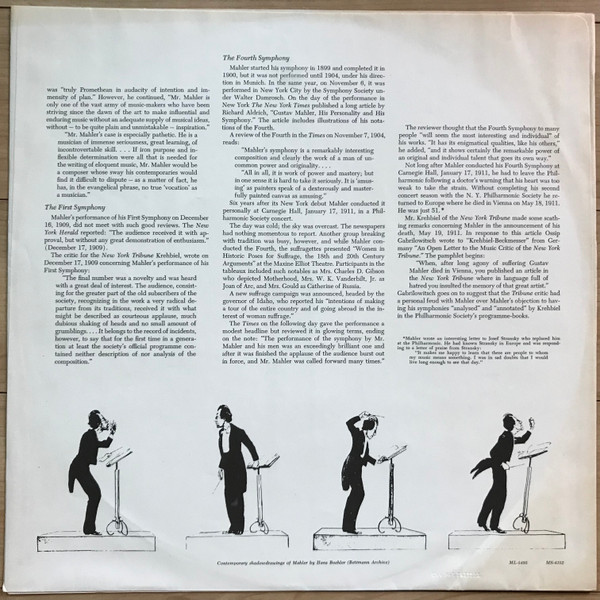
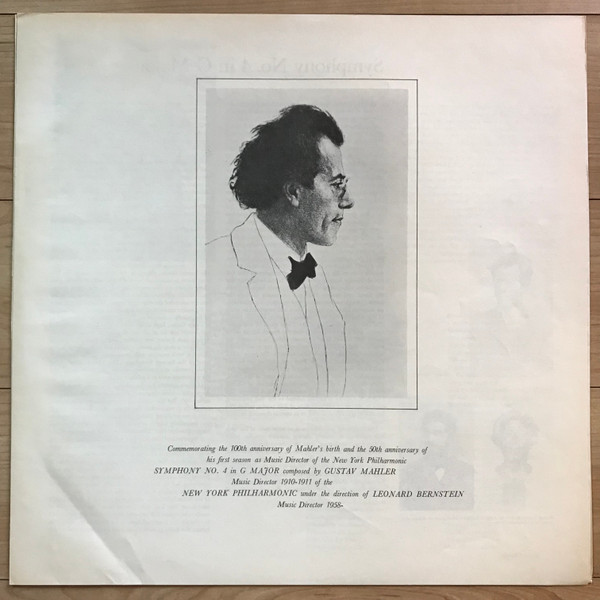
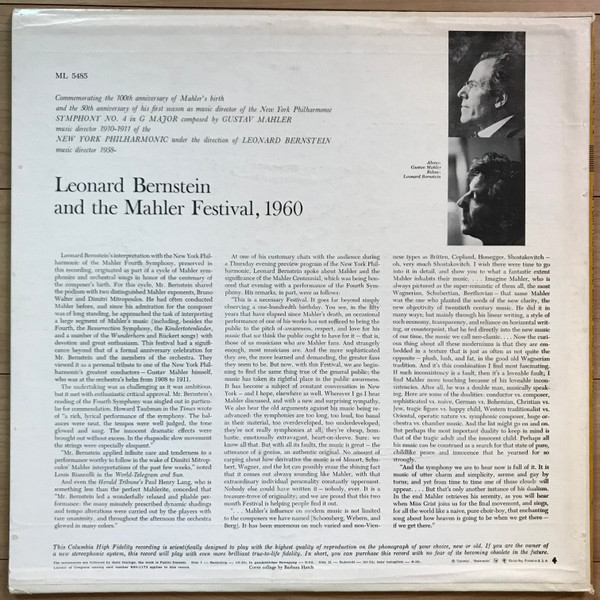
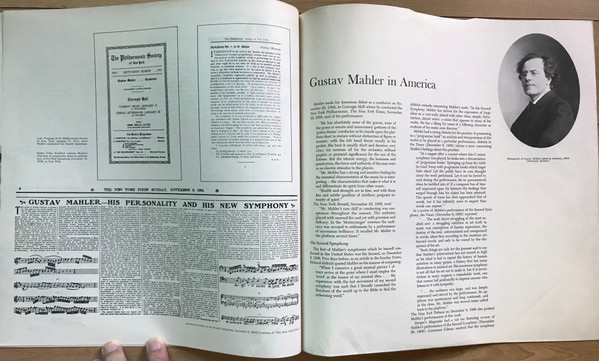
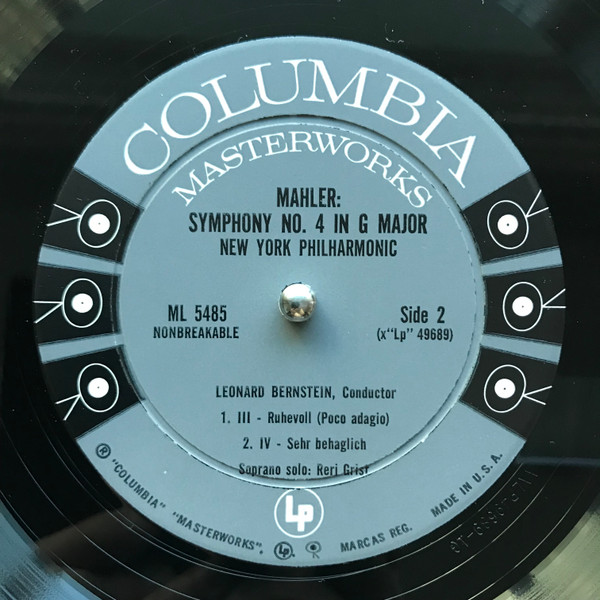
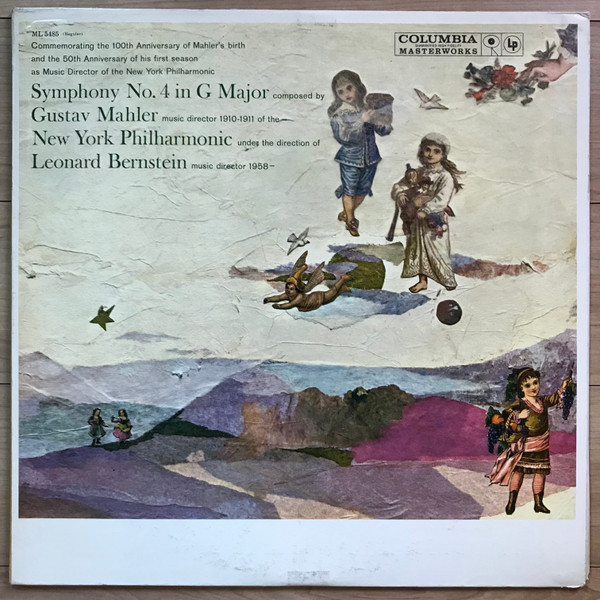
Catalog Numbers
ML 5485Labels
Columbia MasterworksListen online
- online anhören
- écouter en ligne
- ascolta in linea
- escuchar en línea
- lyssna på nätet
- ouvir online
- online luisteren
- kuunnella verkossa
- lytte på nettet
Formats
- Vinyl
- LP
- Mono
Credits
| Role | Credit |
|---|---|
| Composed By | Gustav Mahler |
| Conductor | Leonard Bernstein |
| Orchestra | New York Philharmonic |
Notes
- With printed inner sleeve (Text)
- Columbia Six-Eye Label
- "Commemorating the 100th Anniversary of Mahler's birth and the 50th Anniversary of the first season as Music Director of the New York Philharmonic"
Barcodes
- Matrix / Runout (Side 1 on Label): XLP 49688
- Matrix / Runout (Side 2 on Label): XLP 49689
- Matrix / Runout (Side 1, Runout, Stamped): XXLP49688-1A
- Matrix / Runout (Side 2, Runout, Stamped): XXLP49689-1G
- Matrix / Runout (Side 1, Alt Runout, Stamped): XXLP49688-1H
- Matrix / Runout (Side 2, Alt Runout, Stamped): XXLP49689-1B
About Gustav Mahler, The New York Philharmonic Orchestra, Leonard Bernstein
Austrian composer and conductor.
Born 7 July 1860 in Kalischt, Bohemia (today Kaliště, Czech Republic) and died 18 May 1911 in Vienna, Austria.
Gustav Mahler (German pronunciation: ; was a late-Romantic Austrian-Bohemian composer and one of the leading conductors of his generation. As a composer, he acted as a bridge between the 19th century Austro-German tradition and the modernism of the early 20th century. While in his lifetime his status as a conductor was established beyond question, his own music gained wide popularity only after periods of relative neglect which included a ban on its performance in much of Europe during the Nazi era. After 1945 the music was discovered and championed by a new generation of listeners; Mahler then became one of the most frequently performed and recorded of all composers, a position he has sustained into the 21st century.
Born in humble circumstances, Mahler showed his musical gifts at an early age. After graduating from the Vienna Conservatory in 1878, he held a succession of conducting posts of rising importance in the opera houses of Europe, culminating in his appointment in 1897 as director of the Vienna Court Opera (Hofoper). During his ten years in Vienna, Mahlerwho had converted to Catholicism from Judaism to secure the postexperienced regular opposition and hostility from the anti-Semitic press. Nevertheless, his innovative productions and insistence on the highest performance standards ensured his reputation as one of the greatest of opera conductors, particularly as an interpreter of the stage works of and . Late in his life he was briefly director of New York's and .
He wed fellow composer and musician on 9 March 1902. They had two daughters, Maria Anna Mahler (03.11.1902-05.07.1907) & .
Mahler's œuvre is relatively smallfor much of his life composing was a part-time activity, secondary to conductingand is confined to the genres of symphony and song, except for one piano quartet. Most of his ten symphonies are very large-scale works, several of which employ soloists and choirs in addition to augmented orchestral forces. These works were often controversial when first performed, and were slow to receive critical and popular approval; an exception was the triumphant premiere of his Eighth Symphony in 1910. Mahler's immediate musical successors were the composers of the Second Viennese School, notably , and . and are among later 20th-century composers who admired and were influenced by Mahler. The International Gustav Mahler Institute was established in 1955, to honour the composer's life and work.
Real Name
- Gustav Mahler
Name Vars
- Fauré
- G. Mahler
- G. Meler
- G.Mahler
- Gustav
- Gustave Mahler
- Maher
- Mahler
- Mahler G.
- Mahler Gustav
- Mahler, Gustav
- Malher
- Marhler
- Μάλερ
- Г. Малер
- Г.Малер
- Густав Малер
- Малер
- °¹¿ÕûÞüéü
- Þüéü
